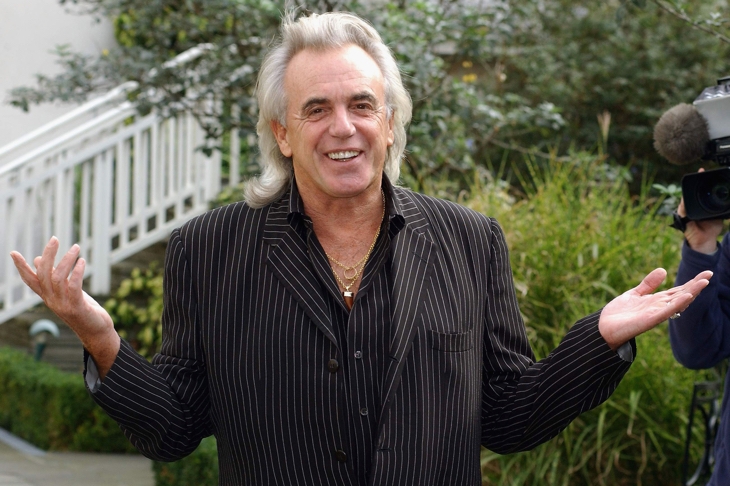When you think about Peter Stringfellow, aka ‘Stringy’, it’s hard to think about anything other than topless women. Stringy, who’s just died aged 77, made a fortune first out of music clubs – early bookings included the Beatles – and then out of women who’d mislaid their tops.
Not the most salacious of pursuits, you might think. And the sleaziness of the image wasn’t helped by the foot-long mullet and the taste for leopardskin-print outfits. Certainly, on the outside, all those trashy clichés rang true in 2000, when I interviewed Stringy for The Spectator shortly after his 60th birthday.
On his birthday, he sat on a gold throne in his Covent Garden nightclub, and consumed a three-course Taittinger champagne supper, flanked by the prettiest tabloid journalists invited to the occasion.
His godson paid tribute: ‘He’s made a lot of people divorced, he’s made a lot of people married.’ And then Stringy polished off the last of his strawberry sponge before launching into a surprisingly good rendition of ‘I Believe I Can Fly’.
All this was paid for by the backbone of his operation: 100 ‘angels’ working the 40 tables, swinging themselves around steel poles, before gyrating over the laps of businessmen in various states of inebriation.
For any puritan, it was a scene of wild, orgiastic horror. In fact, it was very tightly controlled – there was no contact of flesh on flesh. And, in between dances, the angels got back into their tight white dresses, before stripping them off again on request from a businessman.
When Stringfellow introduced lap-dancing into this country in 1996, a three-foot rule was introduced. This meant that an angel must begin her dance three foot away from the customer. She was allowed to break into the three-foot exclusion zone and go as close as she likes to the customer as long as there is no actual contact, but she couldn’t stay close for any period of time and had to keep bobbing back periodically outside the three-foot range. The local council was so adamant about the rule that, at first, all dances were filmed and a council worker was deputised to watch hours and hours of footage to ensure that the angels were constantly checking in and out of the three-foot barrier.
‘It’s a lot more restricted here,’ agreed one of the angels, Shy, from the Gold Coast near Brisbane. ‘In Australia, you can do anything you want. Police uniforms, handcuffs.’ In a quick straw-poll, Yoka from Slovakia, Lola from Hungary and Diamond (also from the Gold Coast) were all in favour of lifting the restrictions placed on them. ‘Peter treats us very well,’ said Cass, one of the few English angels. ‘He could apply for a licence for full nudity — we’d be happy doing it — but he doesn’t think it’s right for the clientele. Still, I think everyone wants to get rid of the three-foot rule.’
At midnight, the women gathered for the Parade of Angels. To a backing track of ‘Fanfare for the Common Man’ and Mendelssohn’s ‘Wedding March’, 50 angels sashayed down the middle of the room, followed by the nine angels of the month for the year so far, succeeded by the angel of the year, a six-foot Amazon who leapt to the top of a pole before gently sliding down it. Then the topless dances began once more.
Not everyone’s cup of tea – particularly in these MeToo times. But, if you can put aside the sleaze – and I’m not expecting anyone to – it was a brilliantly run operation. And Stringfellow, when I interviewed him a few days later, was an extremely astute businessman; highly intelligent, friendly and utterly self-aware. Unlike so many ‘larger than life’ characters, he was extremely open to being questioned by the press, too.
He was also a keen Tory. On the night I visited the club, among the crowd was one of the whips in Ted Heath’s 1970 administration, Lord Bethell. ‘I’ve always been a Tory, even though all the steelworkers in Sheffield were Labour to a man, my dad [a steelworker] included,’ he told me, ‘But what I didn’t like was the way the Labour Party never encouraged you to better yourself. Now, even my dad has come round to my way of thinking. He’s seen how well I’ve done as a businessman — he never owned a house until the 1970s when I bought him one. And now he’s as right-wing as they come; spits blood at the mention of the Labour party.’
‘Whenever I do talks at Oxford or Cambridge University, I always say that more private health and private education are the way forward. Both my children and both my grandchildren are privately educated. By all means, have a system for those who can’t afford it, but for those who can, they should pay for themselves. People spend loads on everything else houses, cars, going out — but they don’t think it’s their job to pay for their health, which is kind of important.’
Stringy also declared himself a tremendous fan of the works of John Locke. His nightclub operation may have been a bit sleazy, his hair and clothes a little naff, but Stringy was, at heart, an intellectual conservative.






Comments